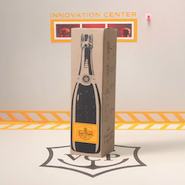 Still from Veuve Clicquot's Naturally Clicquot video
Still from Veuve Clicquot's Naturally Clicquot video
LVMH-owned Champagne house Veuve Clicquot's eco-friendly mission is evolving to include packaging that repurposes leftover grape skins.
Veuve Clicquot unveiled its new Naturally Clicquot packaging on social media, explaining to followers that it is the first of its kind and is produced from the skin of grapes used to make its Champagne. Increasingly, brands are finding ways to do business in a more sustainable way and have been open and transparent about these changes to leverage consumer interest in environmentally-sound products.
Recycle, reuse, reduce
On a microsite created for the Naturally Clicquot initiative, the Champagne house delves into the details of its new sustainable packaging. In an animated section, Veuve explains that it uses grapes to create its Champagnes, and the skins that are left over are then used to make a bio-based material.
The bio-based material is then used for Veuve Clicquot’s innovative packaging, a Champagne bottle case that is 100 percent biodegradable and recyclable.
A secondary video goes into more detail in a humorous way, casting Champagne corks as Veuve Clicquot wine makers who go through each step of the process, from smashing grapes with their “feet” to using kitchen appliances to create the bio-based packaging material. Subtitles explain why this cause is important to Veuve Clicquot.
Naturally Clicquot
In an “Eco-responsibility’ section, Veuve Clicquot says that environmental consciousness stems from the importance of the terroirs of its vineyards. To this, Veuve Clicquot has established five commitments: monitor, reduce, pursue, involve and share.
Veuve Clicquot continues its effort with sections on its vineyards, wines, eco-conception and its history. Under each tab, the brand offers insights to aspect of its responsibility measures.
These points include that 100 percent of its vineyards use sustainable viticulture and that 100 percent of wastewater is treated, among others.
In another transparency effort, Veuve Clicquot has worked to capture the savoir-faire of its employees in a video series that spins craftsmanship marketing as candid employee profiles.
Housed on the brand’s Web site, the “We Are Clicquot” series consists of five episodes capturing different vineyard roles to take a new spin on the notion of a craftsmanship video. While craftsmanship videos are immensely popular among luxury houses, showcasing employees in a candid fashion personalizes a brand and its offerings through the creative insights shared by the featured individuals (see story).
